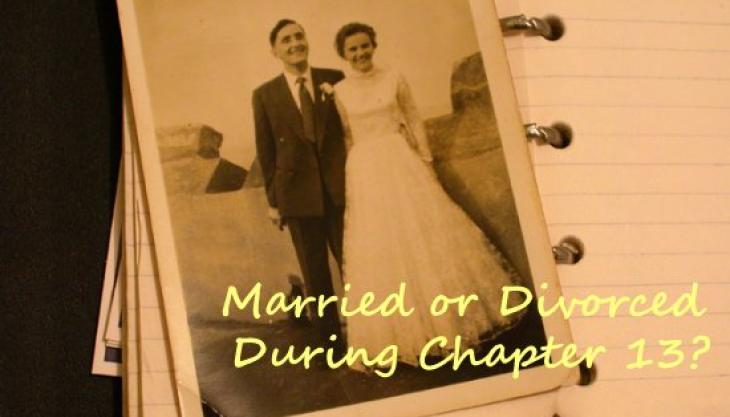What Happens to Your Bankruptcy If You Get Married (or Divorced) During a Chapter 13?
Submitted by Rachel R on Mon, 08/03/2015 - 9:58am

How does changing marital status change a bankruptcy?
Image Source: FreeImages.com
Because a Chapter 13 bankruptcy lasts for three to five years, there's a chance that something significant can change during its tenure. What if the change is your marital status? Today we'll look at what happens to your Chapter 13 if you either get married or divorced after the start of your bankruptcy, whether it impacts payments, and what you need to do to get the best outcome for your bankruptcy case.
Joint Chapter 13 then a Divorce
If you and your spouse file a joint Chapter 13 bankruptcy and then divorce, that's a complicated financial circumstance. Here are your options:
- Dismiss the plan.
That takes you back to ground zero and the debts you and your spouse owe are treated as if you never filed. All past due balances are due again and you can then proceed with the divorce, let the court divvy up your debts and, if you still can't afford to pay your share of what you owe, you can file an individual Chapter 13 or Chapter 7 to deal with your debt.
- Split the plan.
This is called a bifurcation and it essentially splits the joint Chapter 13 into two individual Chapter 13s – one for you and one for your spouse. In this case, it would not be your divorce court judge that splits up your debts, but the bankruptcy judge and Trustee. From there, you can each continue paying your Chapter 13 or one (or both of you) could convert to Chapter 7.
- Keep the plan.
If you and your spouse are enjoying a friendly split, you can keep on paying the Chapter 13 plan as if you had never divorced. You still need to notify the bankruptcy court and Trustee that you are divorcing (or have divorced), but so long as you stay current on your plan payments, you should be in good shape and will both receive the discharge at the end of the plan.
Individual Chapter 13 then Marriage
But what happens if you were in a solo Chapter 13 then got married during the plan? This is another circumstance that can represent challenges for your attorney and Trustee. Here's what will matter and how things can change – or stay the same:
- Increased income?
The court wants to know if joining your life to someone new results in additional income in your household. If your new spouse doesn't work, that means no new income, but you should still report the marriage. If your new spouse does work, that means there is more income flowing in and the court will want to know this, in particular.
- Increase expenses?
When you bring someone new into your household, that means additional costs. And if your new spouse has a child or other dependent, that's also a key factor. If you change residences to make room for your larger family, that increases rent. You will also have increased food, utility and personal expenses. The court needs to know if there is added income to offset these.
- Plan modification?
If you have significant new income not offset by expenses, your payments may increase. On the flip side, if you have significant new expenses in your life, post-marriage, that are not offset by income, you may be able to have your plan payments decreased. Your bankruptcy attorney will be able to look at these changes then propose a modification, if needed, to the Trustee.
The primary thing to remember is that any change in status during the life of your Chapter 13 should be reported to your bankruptcy attorney who will then report to the court, as required under the law, to ensure that you are in compliance with your plan.
To find out more about Chapter 13 or Chapter 7 debt relief in North Carolina, contact the Law Offices of John T. Orcutt for a free consultation. Call +1-833-627-0115 to see us in Greensboro, Raleigh, Fayetteville, Garner, Wilson, or Durham.
Debts Hurt! Got debt? Need help? Get started below!
Serving All of North Carolina
- Bankruptcy Attorneys Raleigh NC (North)
- Bankruptcy Attorney Fayetteville NC
- Bankruptcy Attorney Durham NC
- Bankruptcy Attorneys Wilson NC
- Bankruptcy Attorneys Greensboro NC
- Bankruptcy Attorneys Southport NC
- Bankruptcy Attorneys Wilmington NC
Bankruptcy Attorneys Raleigh NC (North)
6616 Six Forks Rd #203 Raleigh, NC 27615 North Carolina
Tel: (919) 847-9750

Bankruptcy Attorney Fayetteville NC
2711 Breezewood Ave Fayetteville, NC 28303 North Carolina
Tel: (910) 323-2972

Bankruptcy Attorney Durham NC
1738 Hillandale Rd Suite D Durham, NC 27705 North Carolina
Tel: (919) 286-1695


Bankruptcy Attorneys Greensboro NC
2100 W Cornwallis Dr. STE O Greensboro, NC 27408 North Carolina
Tel: (336) 542-5993

Bankruptcy Attorneys Southport NC
116 N Howe St. Suite A Southport, NC 28461 North Carolina
Tel: (910) 218-8682

Bankruptcy Attorneys Wilmington NC
116 N. Howe Street, Suite A Southport, NC 28461 North Carolina
Tel: (910) 447-2987
